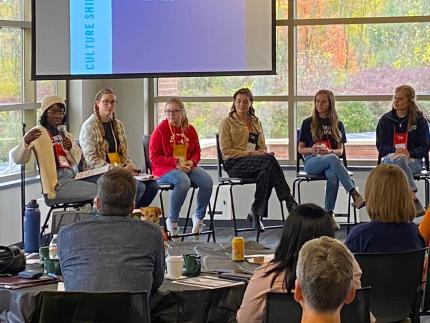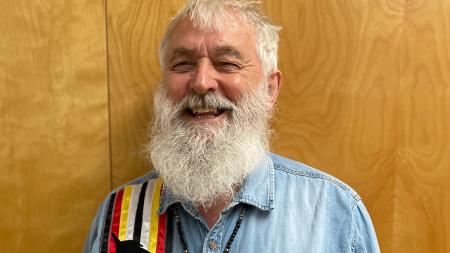Conference Launches New Season of Generation Spark

In mid-October, Generation Spark brought a handful of mentors (older adults) and mentees (young adults) from various churches together in Grand Rapids, Mich., for three days of storytelling, training, a panel discussion, and education toward providing information on how to create new and enduring friendships between generations in a congregation.
Overall, the conference was held to launch a new season in which older adults and young adults from Reformed Church in America (RCA) and Christian Reformed Church in North America (CRCNA) congregations will be building bridges and relationships by working together on a project, with the guidance of the Generation Spark program, over the next several months.
“We brought together people from various places [across North America] to launch into a new season of Generation Spark,” said Ron deVries, a youth and emerging adults ministry consultant for the CRC’s Thrive Ministries. “It was a chance to take the opportunity to learn from each other and to learn from one another’s experiences.”
In 2021, the RCA received a $1.3 million grant from the Lilly Endowment Inc. to support a collaborative effort with the CRCNA to enable the continuation and expansion of Generation Spark, a mentorship program that began at Hope College in Holland, Mich., in 2017 to build intergenerational connections.
At its core, Generation Spark is an intergenerational ministry strategy that pairs young adults (ages 16-24) with mentors (adults ages 45 and up). The goal is to find a way to bring younger people more intimately into the life of a church.
“Generation Spark joins young people and older adults in congregations to build trust and to work together on projects,” said deVries.
While there is a focus on having a young person and an adult to work on a project, the real story here, said deVries, is that Generation Spark “seeks to see a shift in the DNA in a congregation. This program is significant for the church in a time” when young people are leaving or not joining congregations for any number of reasons.
“This is not a silver bullet to solve the issue of young people losing interest in the church,” deVries added. “But this does help plant a seed to develop connections between the generations. It takes work, and it takes time for the participants to realize and recognize how God is working through them and their congregation.”
Mary Hosmar and Laura Willet, who are members of the Generation Spark leadership team at Hebron CRC in Whitby, Ont., held a discussion describing their relationship as mentor and mentee during the recent conference, held at the RCA’s office in Grand Rapids.
“We shared what it was like to work with someone whose work methods are very different from one's own,” said Hosmer, who is serving as a mentor to Willet.
“We were also able to assure the group that this was not as daunting a task as it may seem at first glance. The rewards of getting to know your mentor/mentee and sharing faith stories is worth the effort it takes to get to the point of trusting each other.”
Hosmer added that, in truth, it is always a fluid process to determine who is the mentor and who is the mentee as the relationship evolves.
“Sometimes this is hard to distinguish as we exchange ideas and as we both grow in the process,” said Hosmer. “The idea of our project was totally Laura’s, and the bulk of the work was done by her. I was very encouraged by her enthusiasm and the end result of the work.”
Meanwhile, Willet also participated in a panel discussion with four other young adults, during which, said Willet, they sought “to give conference attendees a glimpse into what life looks like for different young adults of different ages and in different contexts.”
Each talked about what is important to them in a church family, what they have found helpful in keeping their faith strong, and what experiences they have had with a mentor.
“I hope that hearing about the impact that different adults/mentors have had in our lives was encouraging to the church leaders and adults in the conference,” said Willet.
One theme that came out, she added, “was that it wasn’t a particular denomination or modern building or even the pastor that attracted us to our home churches.”
Rather, she said, “it was the warm welcome we received, the family-like environment that drew us. The importance of having a congregation that welcomes you where you are at, nonjudgmentally, and then encourages you to move forward was also raised.”
Speaking of the Generation Spark program itself, Willet said that the “mentors and mentees would not know each other if it weren't for Generation Spark.”
Two situations that took place during the Generation Spark gatherings at Hebron CRC, Willet added, helped to encapsulate the program for her. These offered a glimpse into the vulnerability and honesty that participants in the program can show, she said.
“I overheard one mentor confide to her young mentee, ‘I don't have a creative bone in my body. If you can come up with an idea for a project, I will gladly run with it!’” Willet recounted.
In the other situation, said Willet, as she stood in the lobby of her church when a meeting was about to begin, a teenage girl arrived for the gathering. “She walked through the doors, saw her . . . partner (well into her 70's), and ran toward her and gave her a big hug,” recalled Willet.
As they hugged, the teen’s face, added Willet, “completely transformed. . . . This is a young lady whom I have seldom seen smile, and I have never seen her give anyone a hug. I was shocked . . . in such a good way.”


